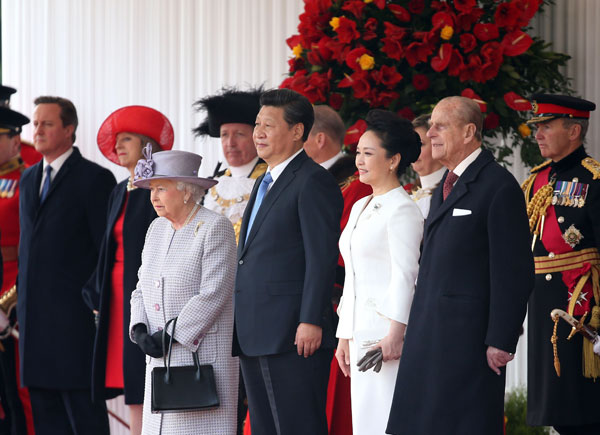China-UK relations and Xi's UK visit
- By Heiko Khoo
 0 Comment(s)
0 Comment(s) Print
Print E-mail China.org.cn, October 22, 2015
E-mail China.org.cn, October 22, 2015
|
|
|
Britain's Queen Elizabeth and Prince Philip (R) stand with China's President Xi Jinping (C) and the president's wife Peng Liyuan, during a ceremonial welcome at Horse Guards Parade in London, Britain Oct 20, 2015. [Pang Xinglei/Xinhua] |
Xi Jinping's state visit to Britain has significantly deepened Sino-British relations. It heralds a big step forward in trade, commerce, investment and people to people contacts. However, the visit will provoke some profound soul searching in Britain about its place in the world. And a big job remains to be done to educate the British public about the reality of Chinese society, politics and economics.
 |
|
Heiko Khoo |
Britain's ruling Conservative Party is attacking workers' living standards, so many feel suspicious of their dealings with China. Others feel threatened by global changes in economic conditions. In September some private steel companies based in Britain tried to amend quality control regulations to stop Chinese imports. The plan failed. However, the announcement of closures and job losses in the steel industry came at the time of Xi Jinping's arrival; and the lack of profits at these companies was wrongly attributed to China. This caused protests by workers and encouraged British politicians to raise the issue with Xi Jinping. It appears that these companies are using this as a means to lobby for state subsidies and protectionism. Ironically, the Indian owned TATA steelworks presented itself as the defender of the British steel industry and therefore, no doubt, deserving of the taxpayers' support to save British jobs. One consequence was that Labour Party MPs began to complain about Chinese steel imports and, all sorts of nonsensical posts on social media claimed that "Chinese products" are "inferior" to British ones and that Chinese goods are produced only by "cheap labour".
This was not helped by a hysterical piece of propaganda presented by the journalist Carrie Grace for the BBC's Panorama TV show called "The Xi Factor". It portrayed a weird and skewed version of the rise of Xi Jinping and of Chinese society as a whole. The show repeatedly referred to Xi as a "strongman" and as "paranoid". The reporter claimed that the Chinese police harassed her and her crew. However, in reality, they were not even detained by the police. This fiction was used to enhance the idea that the TV show was presenting secrets that they alone could reveal. And, when people in Beijing, interviewed in the documentary, speak highly of Xi Jinping, the narrative implies that these people are brainwashed.
Another target for the BBC was the supposed "mystery" surrounding the use of flags by Chinese students - waved to welcome Xi Jinping. It was inferred that this was some sort of organised plot run by the Chinese embassy, rather than an expression of genuine support. The fact that these same students waved British and Chinese flags seemed to be lost in the BBC's reports. The Speaker of the House of Commons, the Conservative MP John Bercow used his speech to pontificate about "freedom" and "human rights".







Go to Forum >>0 Comment(s)